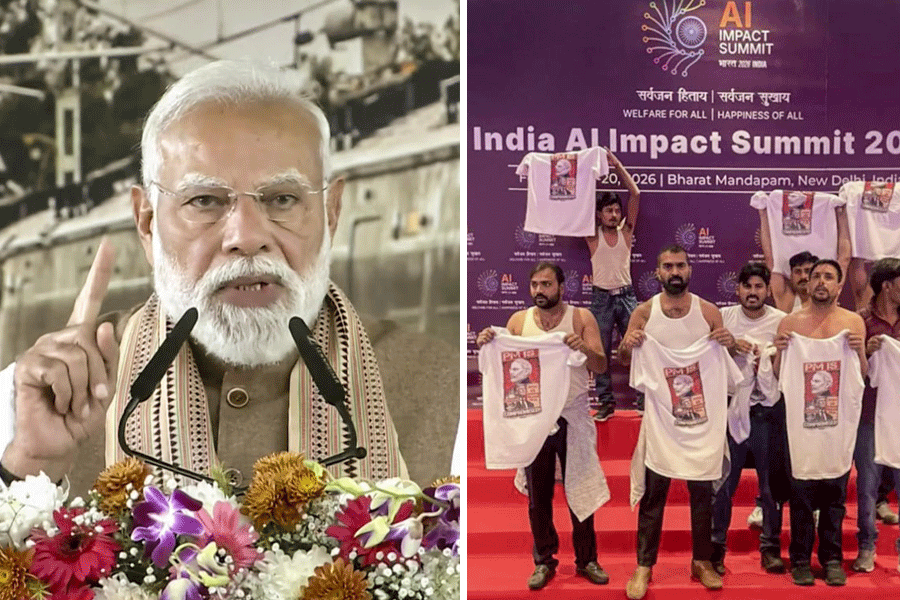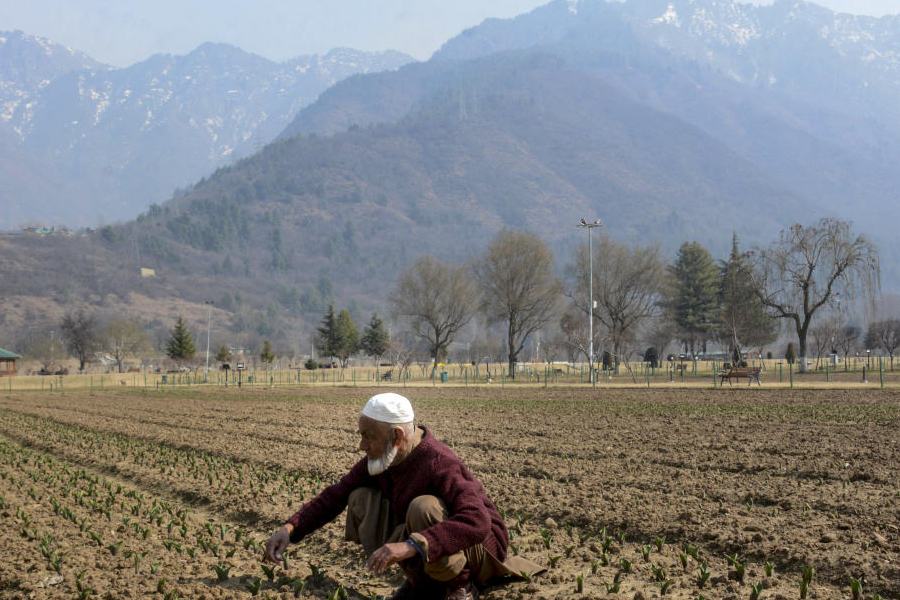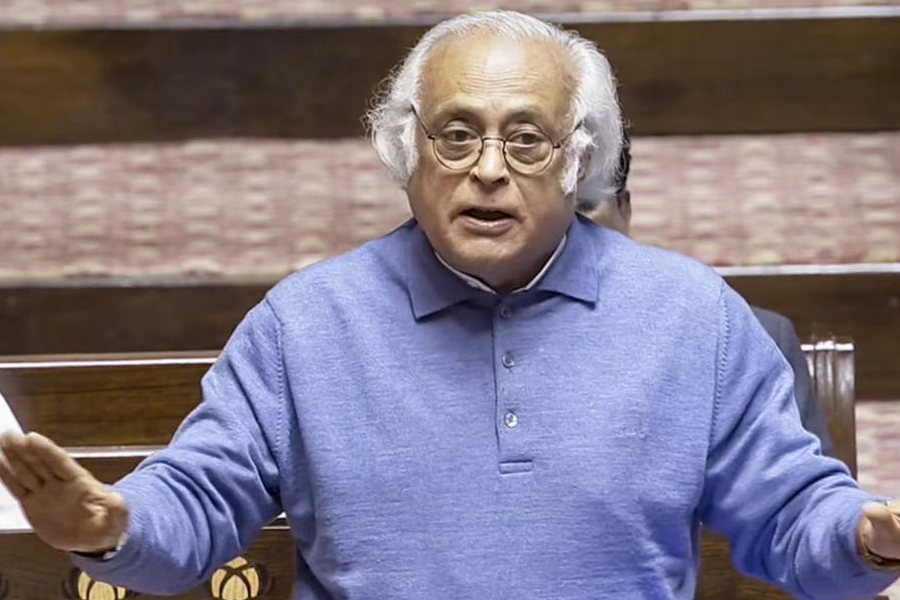 |
 |
Mumbai, Oct. 17: Little Ganesh got lost on the eve of the Ganapati festival and reunited with his mother two decades later on Mahalaya, the day of homecoming for Lord Ganesh’s mother Durga.
But the cascade of coincidences that scripted the happy ending for Ganesh Dhangde, a 28-year-old, lean and athletic police constable, goes far beyond mythological associations and can rival any Bollywood plot.
Sometime in the early 1990s, both Ganesh and his mother had been in tears as Manda R. Dhangde got her name tattooed on her six-year-old son’s forearm — he screaming in pain, she feeling his.
But it had to be done. Manda, a housemaid, had for sometime had no news from her husband, a construction worker with whom she had migrated from a Maharashtra village to Thane, near Mumbai, in search of work. Now she herself faced the prospect of temporary separation from her boy.
“I was pregnant and knew I would be going to the municipal hospital in a few months for childbirth. There would be no one to look after Ganesh. I was afraid he would get lost,” Manda told The Telegraph.
And lost he did get — a month later, weeks before it was time for Manda to go to hospital.
This Mahalaya, mother and son were bathed in tears again — over the same tattoo. She clutching his right forearm, running her finger again and again over the faded, labyrinthine letters bearing her name; he feeling her joy at his return.
“It was a moment straight out of a movie,” quipped inspector Shrikant Sonde of Thane police’s Quick Reaction Team (QRT), which Ganesh had joined this July-end.
Sonde, 55, usually interviews every new batch of would-be commandos who join the QRT, formed after the 2008 Mumbai attacks as an anti-terror combat squad.
“I like to know my boys through and through — their lives, their stories, their strengths and weaknesses. It is important because their job is to handle critical combats, and they need to be free in mind and spirit to take on gunfire from terrorists,” Sonde said.
When Ganesh’s batch joined, Sonde had his usual “sabha” and everybody was eagerly recounting their life experiences. But Ganesh was unusually quiet.
“He almost seemed angry when I asked him to speak about himself. His eyes welled up; he could not speak. When we made him comfortable, what he had to say left us stunned,” Sonde said.
“I decided to help him, not just because he was a team member but because he reminded me of my father’s story.”
The parallel was uncanny. Sonde’s father, a Port Trust employee in Mumbai, had grown up without his parents and spent a large part of his life searching for his family.
“Finally, when he traced his mother’s side of the family — his father had remarried and moved on — he learnt that she had died while giving birth to him. He found a picture of hers with one of her brothers,” Sonde said.
“The expression on his face when he first saw his mother’s picture is etched in my memory. My father was 45 then. He died in July this year and I met Ganesh the same month — somehow it made me restless.”
Ganesh’s misfortunes had begun a day before his school closed for the weeklong Ganapati festival. The Class I boy had on an impulse decided to skip school and visit the home of a friend’s relative along with a few of his mates.
The boys boarded a train but, midway, a hungry Ganesh followed an older boy out of the train at a railway station in search of food. He lost his way in the platform crowd and boarded a different train, travelling in the opposite direction.
Unable to find his friends, a scared Ganesh cried himself to sleep only to wake up past midnight in a dark compartment at Mumbai’s Chhatrapati Shivaji Terminus rail yard.
Next morning, he ventured to the station and spent the next few days eating at a nearby Ganapati Puja pandal and sleeping on the platform. When it was time for immersion, he accompanied the idol to the Girgaum Chowpattty beach near Marine Drive where immersions were allowed at the time.
“Then everybody went home. I had nowhere to go, so I slept on the beach. Next morning I woke up to find fish being unloaded on the beach from large boats,” Ganesh told this newspaper.
“Many urchins my age were picking up fish that had fallen by the wayside, so I picked up some as well. Then a woman who used to sell the stolen fish found me and took me home.”
Ganesh began going to the CST station with the woman’s son. “I remember his name, Sainath. He would sweep trains, beg or steal at the station — whichever was convenient — and I just tagged along,” he said.
A substantial part of the memories had been reconstructed with the help of Sonde and his team who had over several weeks patiently teased out, from every crevice of Ganesh’s brain, answers about his partially forgotten past.
Forgotten, because a month after he became Sainath’s sidekick, Ganesh was hit by a car outside CST and was rushed to the nearby JJ Hospital.
“The hospital records show he had a brain injury. His correct name was entered in the records — it seems Sainath was one of those who admitted him,” Sonde said.
For three-and-a-half months, Ganesh lay in a coma. When he came round, doctors found he had suffered partial memory loss. Since no one claimed him, he was sent to Anand Niketan, a government-run orphanage.
“This period is mostly a blur in my mind. I just remember I was very good at sports, so they sent me to their compound near Pune which had sporting facilities,” Ganesh remembered.
After he had won a few district-level competitions in athletics events such as the pole vault, the orphanage administrators got him a scholarship to Thane’s Krida Prabodhini, a government facility for district-level sports champions.
“At the orphanages in Mumbai and Pune, I had largely kept to myself, perhaps because of my partial memory loss. But I didn’t much think about my past then. But when I came to the sports institute, I suddenly realised that my peers had parents. It made me very sad,” Ganesh said.
After passing his higher secondary, he enrolled for BA. Encouraged by the sports institute’s dean, he applied for a job with the Thane police constabulary and got through at first attempt.
“After two years of training, I had a job, a bachelor’s accommodation provided by the police administration, and a girlfriend. I was happy, but the veil over my past would haunt me. When Sonde Sir took it upon himself to reunite me with my family, it raised my hopes,” Ganesh said.
After searching for all possible Dhangdes on social network sites and elsewhere across cyberspace, Sonde reached a dead end.
“When the Internet revealed nothing, it proved he had come from a very poor background. Also, it is a practice in very poor families here to tattoo the parents’ names on children,” Sonde said.
“An old hand at the Worli orphanage mentioned that whenever Ganesh was asked where he had come from, he would say, ‘Mama-Bhanje (Uncle-Nephew)’. Since he had suffered memory loss, no one took this strange address seriously.”
It immediately struck Sonde, a Thane resident, that a pair of hillocks on the city’s outskirts were locally known as “Mama-Bhanje”.
“I knew of it as an old slum area. I immediately sent my boys on a search. They found no Dhangde there for days till one old man said that a Raghunath Dhangde who lived in the slum had long died. His wife Manda had remarried and was living nearby with a son from her previous marriage and her new husband and kids,” Sonde said.
When Ganesh walked into Manda’s hutment on October 4, it was Mahalaya. Her brothers and sisters were visiting her.
“Everybody had gathered for lunch after praying to dead ancestors according to tradition. It was a good day to come back from the dead,” Ganesh said.










